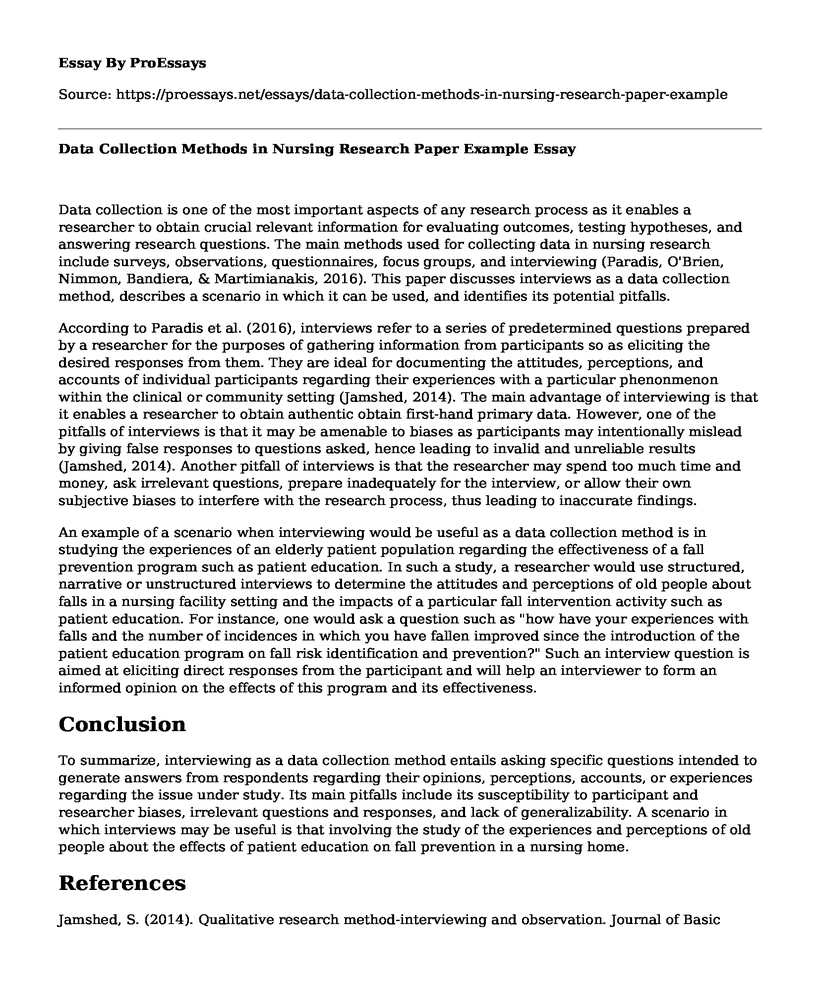Data collection is one of the most important aspects of any research process as it enables a researcher to obtain crucial relevant information for evaluating outcomes, testing hypotheses, and answering research questions. The main methods used for collecting data in nursing research include surveys, observations, questionnaires, focus groups, and interviewing (Paradis, O'Brien, Nimmon, Bandiera, & Martimianakis, 2016). This paper discusses interviews as a data collection method, describes a scenario in which it can be used, and identifies its potential pitfalls.
According to Paradis et al. (2016), interviews refer to a series of predetermined questions prepared by a researcher for the purposes of gathering information from participants so as eliciting the desired responses from them. They are ideal for documenting the attitudes, perceptions, and accounts of individual participants regarding their experiences with a particular phenonmenon within the clinical or community setting (Jamshed, 2014). The main advantage of interviewing is that it enables a researcher to obtain authentic obtain first-hand primary data. However, one of the pitfalls of interviews is that it may be amenable to biases as participants may intentionally mislead by giving false responses to questions asked, hence leading to invalid and unreliable results (Jamshed, 2014). Another pitfall of interviews is that the researcher may spend too much time and money, ask irrelevant questions, prepare inadequately for the interview, or allow their own subjective biases to interfere with the research process, thus leading to inaccurate findings.
An example of a scenario when interviewing would be useful as a data collection method is in studying the experiences of an elderly patient population regarding the effectiveness of a fall prevention program such as patient education. In such a study, a researcher would use structured, narrative or unstructured interviews to determine the attitudes and perceptions of old people about falls in a nursing facility setting and the impacts of a particular fall intervention activity such as patient education. For instance, one would ask a question such as "how have your experiences with falls and the number of incidences in which you have fallen improved since the introduction of the patient education program on fall risk identification and prevention?" Such an interview question is aimed at eliciting direct responses from the participant and will help an interviewer to form an informed opinion on the effects of this program and its effectiveness.
Conclusion
To summarize, interviewing as a data collection method entails asking specific questions intended to generate answers from respondents regarding their opinions, perceptions, accounts, or experiences regarding the issue under study. Its main pitfalls include its susceptibility to participant and researcher biases, irrelevant questions and responses, and lack of generalizability. A scenario in which interviews may be useful is that involving the study of the experiences and perceptions of old people about the effects of patient education on fall prevention in a nursing home.
References
Jamshed, S. (2014). Qualitative research method-interviewing and observation. Journal of Basic Clinical Pharmacy, 5(4), 87-88. doi: 10.4103/0976-0105.141942
Paradis, E., O'Brien, B., Nimmon, L., Bandiera, G., & Martimianakis, M.A. (2016). Design:Selection of data collection methods. Journal of Graduate Medical Education, 8(2), 263-264. doi: https://doi.org/10.4300/JGME-D-16-00098.1
Cite this page
Data Collection Methods in Nursing Research Paper Example. (2022, Sep 18). Retrieved from https://proessays.net/essays/data-collection-methods-in-nursing-research-paper-example
If you are the original author of this essay and no longer wish to have it published on the ProEssays website, please click below to request its removal:
- Parkinson's Disease Essay
- Poly-Victimization of Children: Disability as a Risk Factor and Adverse Impacts Essay
- Elements of an Organizational Model of Health Care Performance, Quality Assessment, and Management
- Essay Sample on Sleep Deprivation and Sleep Debts
- Obesity is a Disease - Essay Sample
- Paper Example on Exercise for Health: Benefits of Physical Activity
- Don't Participate in Coronavirus Parties: Here's What to Know About Herd Immunity - Annotated Bibliography







